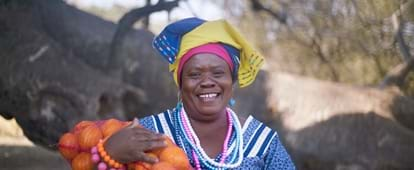By creating an account, I agree to the
Terms of service and Privacy policy
Choose your country and language:
Africa
Americas
Asia Pacific
Europe
TThe Bapedi tribe (also known as Pedi and Basotho) arose from small chiefdoms that were formed before the 17th century. They were defeated in the 19th century by the armies of Mzilikazi, the king who founded the Matabele kingdom. They were then revived by Pedi chief Sekweti.
The Bapedi tribe practices the ancestral customs. The Malopo ritual is the most ritual of understanding the Bapedi culture. This is overall called go phasa. This ritual usually involves the animal sacrifice or the presenting of beer by the most key figure family member called Kgadi. Some slaughter goats or cows when they need to communicate with their ancestors while some use snuff and tlhotlwa (African traditional beer). Ancestors may come to you via a spiritual power and give you strength to heal through ditaola (bones).
WWhen they prepare traditional beer, they use different kinds of mabele (sorghum meal), which is mixed with hot water. They then store the mixture in a cold place, a self-made traditional house made of tree branches. When it’s ready, the old women brew it, and then pour it into moeta (muddy pots), and serve it to the elders. They don’t drink from regular cups, but from mokgopu (traditional cups). Traditional beer for others is only cooked and served at weddings and ancestral ceremonies.
Bapedi also have different kinds of cultural music:
- Mpepetlwane, played by young girls.
- Mmatšhidi, played by elderly men and women
- Kiba/Dinaka, played by men and boys, and now joined by women
- Dipela, played by everyone
- Makgakgasa, played by older women
Bapedi eat meat and vegetables, and popular dishes include thophi (made from maize meal and a fruit called lerotse, a melon), mashotja (Mopani worms), moroga wa dikgopana (spinach cooked and left to dry in the sun), and dikgobe (coarsely ground corn/samp and beans).
Foods are cooked on the ground using firewood and a three-legged pot - the Bapedi don’t use gas or electricity to cook.


AAbout the author
Mankgase Mashabela started writing Pedi books in 1992. He has published seven books and edited two others. In 2011, when the Society for Bapedi Culture and Music was formed, he was appointed as spokesperson. In 2015, he was honoured for his contribution to Sepedi culture and music. He is currently shooting a documentary on Bapedi culture that will be screened on local television.
Related articles

|Terms and conditions|Disclaimer|Privacy policy|Social Media Terms and Conditions|Competition Terms and Conditions
